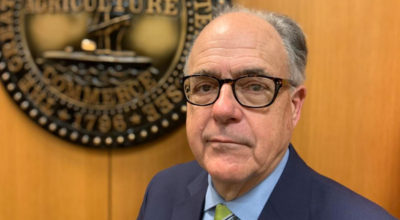


FRANKLIN, Tenn., Dec. 14, 2021 — A judge throws out a case of trespass against an investigative reporter who breached security of a meeting of judges whose secrecy rules violate the state constitution and its open meetings act.
By David Tulis / NoogaRadio 96.9 FM
Williamson County sessions court judge M.T. Taylor dismisses the criminal case against this reporter in a 70-minute legal wranglefest over the rights of the press on one hand and judicial policy on the other.
“Well, I’ll tell you something,” Judge Taylor says.
“What is your report?” I ask from the podium in a mini-courtroom.

“My report is, I’m not going to give you what you want. I’m going to find there is no probable cause.”
Radio station midstate bureau chief Christopher Sapp says “Thank you” from the witness stand — and I say, “I didn’t quite hear you.”
“Yeah, I know,” the judge says, dryly. “I find there is no probable cause. Don’t thank me, because that’s not what you want.”
The ruling is uttered before Chris Vernon, assistant district attorney, makes a closing argument.
“”Intellectual integrity and an honest heart would not permit the thighs of tyrany, calves of corruption, or the ankles of arrogance to raise feet of deceit over the low — low — bar of probable cause,” says Mr. Sapp.
“The one-eyed giant of judicial secrecy just faltered, fumbled, and stumbled over the pebble of David Tulis.”
More than once, Judge Taylor declares that he finds probable cause and that the state is making a plain-on-its-face case against me.
Franklin city policeman William Orange identifies me as the person accused. It is testified that I had been told to leave by a person ostensibly in authority. He says I refused to get out of my conference ballroom chair and depart, even though ordered by hotel manager Lisa Hegwood of Embassy Suites of Cool Springs — “a prima facie case” of criminal trespass.
The hearing pits our rights as reporters to witness a public meeting on property converted into state property by a rental contract vs. the property rights exercised, ostensibly, by hotel manager Hegwood, in her yellow blouse and under her corporate nametag.
In dismissing the case, Judge Taylor is deflecting our attack on the judiciary’s long unchallenged secrecy and to shield Roger Page, chief justice, whom in argument I accuse of being complicit not just in tort against my person, but in official oppression and official misconduct, felonies in the state criminal code at Title 39. In rescuing the chief justice and to tamp the growing scandal of judicial abuse, he also appears to fulfill the doctrine of interposition by a lesser magistrate — a concept the popularity of which is evidenced in the growing “sanctuary city” movement.
Government ‘in secret’ forbidden
The hearing contains the elements of human interaction, even humor, belying the high issues brought into view outside of Judge Taylor’s limited task: Determining that a crime had been committed, and that I am the correct person charged in it.
Judge Taylor argues that the reporters’ high-toned arguments about their rights to be in the city court judges’ inner sanctum at their three-day conference are beside the point, and not part of the hearing. Holding up the contract between Embassy Suites and AOC, he insists it doesn’t bar the hotel staff from being the offended party in a trespass claim — “Nowhere does it exclude the owner of the premises from deciding who gets to come in,” Judge Taylor says.
“I find there is no probable cause. Don’t thank me, because that’s not what you want.”
Judge M.T. Taylor
“That’s what lawyers do,” the jurist says. “There’s nothing in here that you said — you said the man said the hotel had given up their right to make a decision about excluding anyone from the premises because of this lease with the judicial conference. The lease with the judicial conference for the use of that space doesn’t, in my estimation, doesn’t take away the hotel’s authority to exclude anybody they want to exclude from the premises for whatever reason they want to exclude them. It doesn’t say that.”
My covering the Tennessee judicial conference Nov. 6 was under the authority of the Tennessee bill of rights, Art. 1 sect. 19 and under the open meetings act, which says “the formation of public policy and decisions is public business and shall not be conducted in secret” T.C.A. § 8-44-101. We cite a case, Dorrier v. Dark, 537 S.W.2d 888, 892 (Tenn. 1976), that affirms the claims of the open meetings act upon the judge events.
The judge suggests its safer for protesters of government wrongs to leave contested premises and sue later over the right. I invoke the name of Rosa Parks, arrested in Montgomery, Ala., for sitting in the white part of a city bus and forcing police to arrest her to give her standing for appeal.
Judge Taylor insists I am involved in civil disobedience. But he appears to have grudging admiration for people who stand on principle when asserting their rights, even if falsely seized. Others “want to be civilly disobedient, but they don’t want to go to jail. So, they’re looking for what you call a free pass. And the only way to get that is to go through the court system to decide whether this law is impermissible based on the facts that you asserted. You’re sorta going about it in the most obviously dangerous way of doing it.”
“But in the meantime she went to jail,” the judge says. “There are all kinds of wonderful people who are right. But you’ve got to be willing to pay the price for being arrested.”
“Well, I’m here,” I say, “because I’m willing to pay that price, sir, a member of the press. I know what I am doing. I wasn’t snookered into this.”
Mr. Sapp testifies that he told the officers ordering him to leave —
Is there any jeopardy in me sitting here? I’m not creating a disturbance. I’m not being disorderly, I’m not being unruly. Why am I being asked to leave? I’m a member of the press. I have a constitutional right to be here. This is a public meeting. I have a constitutional and a statutory right to be here. This conference does not have a right, because it is a state-owned property at this point, does not have a constitutional right to ask me to leave.
No legal authority was cited behind commands to leave the public meeting. He says his research into the law indicates the court system is not exempt from state law, no matter how many policies and rules it has keeping members of the public out of its policy events. Mr. Sapp says he has as much right to cover the meeting of jurists as attend a school board meeting.
He quotes a former president.
Abraham Lincoln once said, ‘If we were to call a tail a leg, how many legs does a dog have?’ And most people would say five. But five is the wrong answer because a tail is still a tail. Because you call it a leg doesn’t make it a leg. And just because administrative offices of the court was contending that that was a place that they could *** ask us to leave from, we did not feel that it was. We felt like it was wholly inappropriate.
The judge cites law that says criminal trespass is a person “on property *** without consent of the owner,” and says Mrs. Hegwood represented the owner.
“The explanation we gave her, your honor, and John Crawford *** is that we were here by right. And that right supersedes her authority to throw us off, especially since we’re not in riot, or causing any kind of breach of the peace or public disturbance. There was not a public offense by me sitting at my computer.”
Growing woes in judiciary
The judicial system is implicated in fraud in a case for which I am the relator, a petition for mandamus to compel the governor to obey the health statute that he violated in declaring a state of emergency in March 2020 over the Covid-19 “pandemic.”
My lawsuit against Gov. Bill Lee is set for oral arguments Dec. 18 in Knoxville. The case points a finger at the state’s justices in fraud, official misconduct and oppression, with 6.8 million people victimized by the courts’ complicity in Gov. Lee’s prison planet decrees under pretended powers claimed without a warrant or lawful exigency required to invoke police powers. The constitution also bans martial law, legislating by the governor and the overthrow of the constitution or any protected right. The judiciary appears to have entered into a joint venture with Gov. Lee and both political parties to abrogate the constitution, and to decohere and de-amalgamate Tennessee statute that governs all state and county activities.
My filings claim a Hamilton County chancery judge, Pam Fleenor, is involved in abuse of law and fraud. Her mismanagement of my lawsuit prompted me to file three administrative grievances to the supreme court. These were denied without comment. Recently, chief justice Jeff Bivins was replace by Justice Roger Page. We sent Justice Page two analyses about press rights and the open meetings act to get access to the conference in Franklin.
The head of the administrative office of the courts, Deborah Tate, said she is quitting. The announcement came as her office sought to meet a seven-day deadline to disgorge documents under the open records law in connection with the torts, ethics rules violations and criminal offenses behind my unlawful arrest.


Congratulations on winning a battle. Take a moment of joy in it.
However, the war goes on. Please make sure you fight the right war!
Congratulations are in order. What effect will this have on your presence future conferences? Does it mean you can attend and cover next year’s event without being molested or arrested?
The next judicial conference is in March. We’ll see about insisting again on my right to attend, just as I did before, giving detailed notice and rationale ahead of time and asking the officials to stand down. My bureau chief, Christopher Sapp, and I are fully into this battle and we intend to prevail, in God’s sovereign grace.